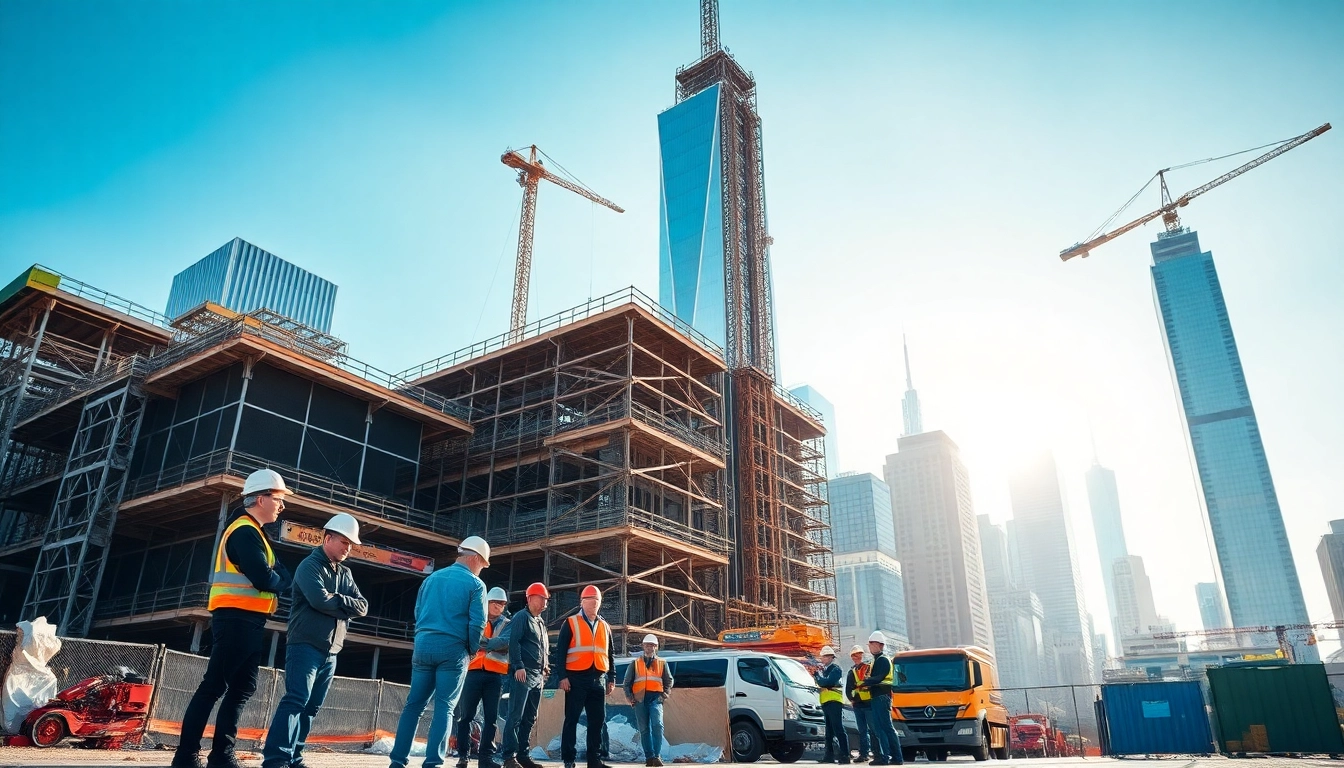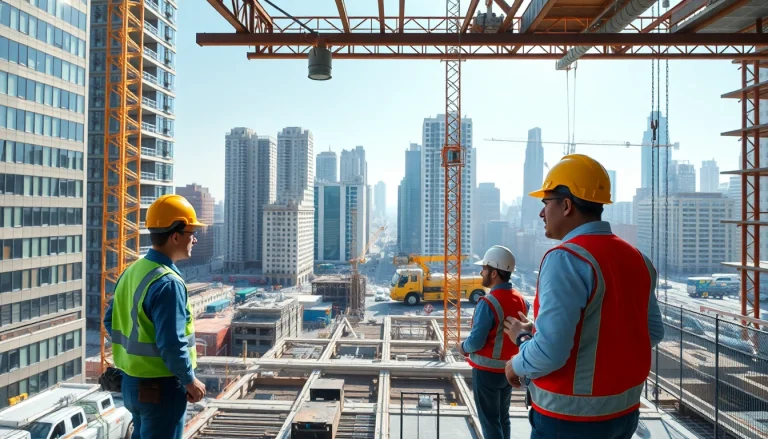Understanding the Role of a New York City Commercial General Contractor
In the dynamic landscape of New York City’s construction industry, the role of a New York City Commercial General Contractor is multifaceted and critical to the successful execution of any commercial project. These professionals not only manage but also oversee complex construction processes, ensuring that they meet specific requirements and adhere to local regulations. The following sections delve into the key responsibilities of these contractors, the benefits of their expertise, and the various types of projects they typically handle.
Key Responsibilities and Duties
A New York City Commercial General Contractor is primarily responsible for the successful completion of a construction project. Their key duties include:
- Project Management: They coordinate all aspects of the project, from initial planning and budgeting to final inspections and handovers.
- Team Coordination: General contractors are tasked with managing subcontractors, ensuring that everyone involved in the project is on the same page and that work proceeds as scheduled.
- Budgeting: They prepare estimates, manage expenses, and keep the project within budget, avoiding financial pitfalls that can arise during construction.
- Permitting and Compliance: With an extensive understanding of local regulations, commercial contractors navigate through zoning laws, building permits, and other legal requirements that are crucial for project approval.
- Quality Control: Ensuring a high standard of work is another vital duty. This involves regular inspections and ensuring that all construction meets the necessary safety standards and codes.
Benefits of Working with Professionals
Engaging a professional New York City Commercial General Contractor provides numerous benefits that ultimately lead to a smoother construction process:
- Expertise and Experience: With specialized knowledge of local building codes and an understanding of the best practices in construction, contractors can foresee potential issues and mitigate risks effectively.
- Time Efficiency: By managing timelines and scheduling efficiently, contractors help ensure projects are completed on time, which is crucial in a bustling city like New York, where delays can lead to substantial extra costs.
- Access to Resources: Established contractors have relationships with suppliers and subcontractors, which can secure materials at a better price and ensure quality workmanship.
- Stress Reduction: Wedding various aspects of a construction project—from logistics to labor management—under a single contractor minimizes stress for the property owner.
Types of Projects Managed
New York City Commercial General Contractors handle a diverse range of projects, including:
- Office Buildings: From renovations to entirely new constructions, contractors manage everything from design to completion while adhering to corporate standards.
- Retail Spaces: Transforming retail spaces requires understanding customer flow and product display needs, leading contractors to implement vital design elements effectively.
- Hospitality Construction: Working on hotels and restaurants involves unique challenges, including coordinating with multiple stakeholders while ensuring compliance with health and safety standards.
- Industrial Projects: These often require specialized knowledge in constructing factories, warehouses, and other facilities that cater to industrial needs.
How to Select a New York City Commercial General Contractor
Choosing the right New York City Commercial General Contractor is crucial for the success of your project. Here are some essential steps to guide you through the selection process.
Evaluating Experience and Expertise
When assessing potential contractors, examine their portfolio and past projects. Key factors to consider include:
- Specialization: Ensure the contractor has experience in the type of project you are undertaking.
- Project Size: Consider whether they’ve successfully managed projects of a similar scale and complexity to yours.
- Industry Knowledge: A contractor’s understanding of various industries can be beneficial, particularly in niche sectors like healthcare or technology.
Checking References and Reviews
Client feedback is invaluable. Potential clients should:
- Request References: Direct insights from past clients can provide a clear indication of the contractor’s reliability and quality of work.
- Read Online Reviews: Platforms like Google and Yelp can offer additional perspectives on the contractor’s reputation within the community.
- Visit Completed Projects: If possible, visit previous projects to evaluate the quality of work firsthand and speak with the property owners about their experience.
Understanding Licensing and Insurance Requirements
In New York City, commercial contractors must meet specific licensing and insurance requirements crucial for safeguarding both them and the client:
- Licensing: Verify that the contractor holds all necessary licenses required by the state and local government to undertake construction work.
- Insurance: A reputable contractor should carry liability insurance and workers’ compensation to protect all parties involved in the project from unforeseen liabilities.
Cost Considerations When Hiring a New York City Commercial General Contractor
Understanding the cost structure of hiring a New York City Commercial General Contractor is essential for effective budgeting. This section provides a breakdown of critical financial aspects to consider.
Breaking Down Construction Costs
Construction costs can be broken down into several categories:
- Labor Costs: This includes wages for workers and subcontractors engaged in the project.
- Materials: Costs for building materials, fixtures, and furnishings that make up the project.
- Permits and Fees: Cost for obtaining necessary permits, inspections, and other regulatory fees.
- Contingency Fund: Setting aside a percentage (typically 10-20%) of the total project cost for unexpected expenses.
Comparing Quotes from Different Contractors
When obtaining quotes, it’s important to compare them thoroughly:
- Scope of Work: Ensure that each quote outlines the same scope of work to allow for accurate comparisons.
- Payment Terms: Understand each contractor’s payment terms and conditions to prevent misunderstandings later on.
- Inclusions and Exclusions: Clarify what is included in the price and what may incur additional charges.
Understanding Hidden Fees and Charges
Construction projects can often incur hidden fees if not managed properly. Common hidden costs include:
- Change Orders: Additional modifications to the project often lead to unexpected costs.
- Site Conditions: Unforeseen underground problems may cause additional expenses and require adjustments to your plans.
- Delays: Increases in labor costs due to project delays can impact your overall budget significantly.
Best Practices for Collaborating with Your New York City Commercial General Contractor
Effective collaboration with your contractor is vital for project success. Here are best practices to ensure a productive partnership.
Establishing Clear Communication
Clear lines of communication can greatly enhance the efficiency of a project. Consider these tips:
- Regular Meetings: Schedule consistent updates to discuss progress, challenges, and solutions that may arise.
- Designate a Point of Contact: Whether it is you or another team member, establish a single point of contact to streamline communication.
- Utilize Project Management Tools: Utilize software solutions to track progress and communicate with all involved parties in real time.
Setting Realistic Timelines and Expectations
Setting achievable timelines can drive project success. Strategies include:
- Define Milestones: Break the project down into smaller, manageable milestones to help track progress accurately.
- Consult with Your Contractor: Leverage the expertise of your contractor to establish timelines based on realistic workloads and site conditions.
- Be Flexible: Understand that factors outside of your contractor’s control may lead to necessary adjustments in the schedule.
Monitoring Project Progress Effectively
Monitoring progress plays a critical role in project success. Effective practices include:
- Regular Site Visits: Physically visiting the site allows you to witness progress first-hand and address potential issues promptly.
- Progress Reports: Request regular reports detailing what has been accomplished versus the planned timeline.
- Maintain a Notebook: Document all conversations and agreements to ensure transparency and accountability among all parties involved.
Common Challenges with New York City Commercial Contractors and Solutions
While hiring a contractor can vastly improve project efficiency, challenges often arise. Understanding these challenges and how to address them can help mitigate risks.
Managing Delays and Setbacks
Delays are common in construction, particularly in a bustling city like New York. Adopting proactive measures can minimize their impact:
- Identify Potential Delays: Discuss with your contractor potential setbacks and how they plan to mitigate these risks.
- Have a Contingency Plan: Setting aside time in your timeline to account for delays can keep your project on track.
- Stay Informed: Regularly communicate with your contractor to receive updates on project timelines and address delays proactively.
Addressing Budget Overruns
Budget overruns can occur for numerous reasons. Strategies to combat this issue include:
- Draft a Detailed Budget: Ensure your budget covers all aspects of the project and incorporates potential contingencies.
- Review Regularly: Conduct periodic reviews of expenses with your contractor to identify any deviations from the budget early.
- Seek Clarifications: If additional costs arise, seek clarity on their necessity and discuss how they impact your overall budget.
Ensuring Compliance with Local Regulations
Compliance with local regulations is particularly stringent in New York City, and negligence can lead to significant project delays or fines:
- Stay Informed: Keep abreast of the latest building codes and regulations to ensure compliance throughout the project.
- Collaborate: Work closely with your contractor to ensure that all aspects of the project are compliant with local laws.
- Hire a Compliance Specialist: If needed, consider hiring an expert to oversee compliance and navigate the complexities of local regulations.





